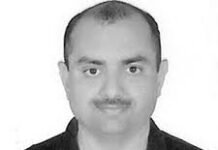On the occasion of IPRMENTLAW completing its first month, I am pleased to bring to you our first guest interview with Mr. Sanjay Tandon, co-founder and CEO, Indian Singers’ Rights Association (ISRA).
Mr. Sanjay Tandon has been in the Industry for the past three decades and is well known as the Collective Management of Copyright Man of India. He was instrumental in strengthening the Indian Performing Right Society Limited, (IPRS) – the Music Royalty Collecting Society of India for 14 years before resigning from the post of Director General in 2004. He pioneered the Movement of Copyright Administration in India and developed the IPRS from scratch to an internationally recognized entity. He has represented the Country at 5 Copyright World Congresses of CISAC, and 2 Regional Roundtable on copyright under WIPO and is also a regular speaker at various copyright seminars and symposiums. He was also a recipient of a fellowship from WIPO. He also speaks regularly on the subject of copyright in various Universities of the country, police training centres, the FICCI and CII. He was the Leading Copyright Consultant from July, 2004 to September, 2005 to the likes of Lata Mangeshkar, Asha Bhosle, Javed Akhtar, Sonu Nigam, Sunidhi Chauhan, Shaan, and such other 103 top Artists.
In October 2005, Mr. Tandon joined Reliance Communications Ltd as Head – Mobile Content Alliances and set up the Content piece for them till March, 2008, post which he was appointed Vice-President – Reliance BIG Entertainment from April, 2008 to Feb, 2013. From March, 2013 to June, 2018 Mr. Tandon acted as the CEO of the Music Composers Association of India (MCAI) and steered the community of Composers to a victory over getting them back on the Board of IPRS.
Mr. Tandon is the co-founder of the Singers’ Copyright Society – ISRA in 2013 and is today the CEO of ISRA. His struggle to get Singers their Royalties bore fruit in 2012 after his long struggle since 1991 with Singers being accorded a Right to Royalty. Under his leadership ISRA is now establishing the rights of Singers and setting an example of efficiency in Collective Administration of Copyright in India.
In the year 2012, he was closely associated with the proposed copyright amendments in India and as an expert on the subject of copyright, deposed and submitted his recommendations before the Joint Parliamentary Committee on the recent Amendments to the Indian Copyright Act. Certain provisions in the amended law are due to his perseverance with the Government.
All through these years, Mr. Tandon has interacted with many heads of State and Presidents of India, USA, France, Chile, Germany, etc. on a one-to-one basis for Copyright Issues facing India.
Mr. Sanjay Tandon is also a singer and sings in the voice of Mukesh and has sung under the baton of Shankar-Jaikishan, Naushad, Kalyanji-Anandji, O.P. Nayyar, Sonik-Omi, Khayyam and many other legends. He has been conferred with many awards and recognition like the Lata Mangeshkar Award – AP Govt., Rimjhim Madhur Sangeet Puraskar, Rhythm 2003 Award, Sangeet Award – Zee TV, Swar Sangeet Award by U.P, Govt., Mukesh Award by the Andhra Pradesh Kalavedika, 2006 and several others.
1.Mr. Tandon, you have been in the industry for over three decades and were involved in strengthening of the Indian Performing Rights Society (IPRS). Could you talk about the challenges you faced in working towards the development of IPRS?
Though it was an uphill and frightening task to set up IPRS I enjoyed it fully as my efforts were serving the Community of Composers and Songwriters. When I joined IPRS in August 1990, I was a kid of 26 years and to take on the Music Companies and establish the Composers & Songwriters Royalty was a mammoth and seen as an impossible task. In fact, on joining when I went to meet many leading Composers & Writers, they were not even aware about their Rights and their membership of IPRS. I thus undertook the job of educating nearly everyone on COPYRIGHT — the Government (as they were not clued in with collective administration), the Enforcement Agencies & Judiciary (as they thought IPRS was extorting money), the Composers & Songwriters themselves (who were not even aware that they are entitled to Royalties), the Music & Film Industry (as they never seem to even know how Copyright system operates), the Users (as they were used to using Music Free), the International Community (as they thought India does not have Copyright treating it to be a 3rd world country). Challenges were many and the Members and the Board of IPRS was oblivious to all this. I also had to unite all Composers & Songwriters from all across India into the IPRS net. People started to get confidence in the IPRS and everything was at a correct stage of take-off into a efficient and transparent Society, when in 2004 Music Companies took over IPRS and refusing to budge into their plan of a takeover, I resigned in March 2004.
In 1993, I got the 1st Remittance of Royalties of Composers & Songwriters into India ~ GBP72,000. I then educated the Music Industry about existence of ” Music Publishers” and to adopt the international way of working, urged the Owners of Publishing Right (Producers & Music Companies) to become Publisher members of IPRS and strengthen IPRS in its administration. I was responsible to get Mechanical Rights of Composers & Songwriters from SaReGaMa & Universal in 1993. I was also responsible to License Ringtones when they started in 2000. I was also able to take the Radio Industry with me and get everyone to sign up Voluntary Licenses which was acceptable to both the Radio Community and IPRS.
I also raised voice against illegal Re-mixes that Music Companies had started in 2001 and had also met the Dy Prime Minister — Shri L K Advani which resulted in amendments to Section 51(1)(j) as it stands today.
2. You have been instrumental in spearheading some of the amendments introduced in the Copyright Amendment Act, 2012. Could you throw some light on that?
Yes, I have been in this effort to have the Copyright Act amended right from 1991 onwards. I was on the drafting Committee for the 1994 amendments and was also instrumental in pushing for the current 2012 amendments. The issue before the Government was that Artists (Composers, Songwriters & Singers) were being denied Royalties in contrast to Artists of other Countries who received Royalty. Music Industry seemed to be immature and selfish. A type of Zamindari System existed even in the Film & Music Industry which believed in snatching away the Right and Royalties of Artists. As one always says… God comes to rescue when Injustice grows, is in excess and becomes uncontrollable. Thus, God gave Javed Akhtar to the Community and also gave him a place in the Rajya Sabha. He echoed this injustice in Parliament and made it a motto of his life to procure Justice for Artists and have the Law itself amended. I had the good fortune to work under his leadership on this matter (behind the curtains) which ultimately resulted in the 2012 amendments with full support of the Parliament and all political parties.
3. In your view, do you think that the Copyright Amendment Act, 2012 has been able to achieve the objective with which it came into effect?
The Copyright Act, 2012 is one of the best pieces of legislation. This legislation is way ahead of legislation in other countries and the world is looking up to it. I am sure soon it will be a model piece of law in Copyright regime. It is now up to all of us — Government, Stakeholders, Enforcement Agencies, Judiciary, Users, Artists to have the Law implemented in a manner to suit everyone and to evolve systems and put it in place for everyone’s benefits. Towards this end, I think Copyright Societies will have to take the lead and set the ball rolling.
4. If not, then where did the Government go wrong and what steps can be taken to bring about an effective implementation of the Copyright Amendment Act, 2012?
NOT APPLICABLE. Government has done its bit… it is now time for the Industry to sit down and adopt an Industry wide practice etc. Live up to being an Industry like other Industry and not just be called one.
5. In 2013, you formed the Indian Singers Rights Association (ISRA) along with some of the renowned singers in the industry. Could you tell us about your journey behind constituting ISRA?
Since 1992, under the leadership of Lataji, Alka Yagnikji, Sonu Nigamji, Myself and some other leading singers, we took upon the task of changing the way in which singers were treated under the Copyright Act. Till then Singers were considered to be Vocal Instruments. To set this anomaly right, we all got together and started our crusade to have Singers Royalty which we finally achieved on 12th June, 2012. Till the Copyright Rules were released, we readied the CMO in anticipation and got ISRA registered as a Company Limited by Guarantee under the Companies Act (a Section 25 Company) on 3rd May, 2013. Thereafter, we filed for Registration as Copyright Society for Singers (Performer Right Society) and we received our Registration Certificate on 14th June, 2013 thereby becoming the 1st Copyright Society to be Registered under the new Amendments.
We then embarked upon a membership drive, followed by Licensing Notices to Users (friendly ones) followed by Litigation to build jurisprudence and establish our Rights through Courts and had 2 Judgements in our favor.
6. There has been a lot of debate and controversy around the provisions pertaining to the right of performers to receive royalties. For instance, Sec 2(q) of the Act defines ‘performance’ to mean a ‘live performance’ thereby implying that the performers royalty rights are only with respect to commercial use of live performance, whereas Rule 68 Explanation III of the Copyright Rules, 2013 goes on to give a wider interpretation to the definition of ‘performance’ than what has been defined in the Act. What is your take on that?
Absolutely. Not only in India, but everywhere in the world, NEW things are never welcomed. Everyone wants to resist it, resist change, resist equality and fairness and that’s what is happening in India. Further, we all know, Law is such that it can be argued both ways. Thus, the Lawyer fraternity is doing so and is just doing its job of fighting for their clients as per instructions received from them. If instructions are fallacious they would need to fight with that brief. Thus, we have this point which is being raked up. In fact, this point is not at all ambiguous but is being made so.
Each Singer is the Performer of the Performance and/or the owner of the Performer’s Right in a song (unless Performer’s rights have been assigned) and each singer apart from the Performer’s Right also has the inalienable Right to Receive Royalty (the R3) for the commercial exploitation of their Performance, as guaranteed under Section 38A of the Copyright Act, 1957 read with Section 18(1) third and fourth provisos (Section 39A makes Section 18 applicable to Performers Rights with necessary modifications and adaptations). This Right to Receive Royalty (R3) can only be assigned to (a) legal heirs of the performers, or (b) a collecting society for collection and distribution. Any assignment to the contrary shall be void.
As regards the contention that Performer’s Rights, if any, operate in respect of “live performances” and not “non-live studio recordings”, ISRA would like to educate everyone that :
- The proviso to Section 2 (qq) makes it clear that Performers’ rights can flow out of cinematographic films. This makes it amply clear that the interpretation sought to be canvassed is flawed.
- Rule 68 of the Copyright Rules, 2013 in its third explanation states that Performance includes recording of visual or acoustic presentation of a Performer in the sound and visual records in the studio or otherwise. The rule therefore absolutely clarifies and expresses the legislative intent of treating performances in studios as performances worthy of protection under the Act for a Performer.
- The decision in the case titled Neha Bhasin Vs. Anand Raj Anand & Anr., 2006 (32) PTC 779 (DEL) at page 807 states the following:-
“While the definition of “Performer” in Section 2 (qq) of the Copyright Act, 1957 includes within its sweep a singer, Section 2(q) defines “Performance”, in relation to Performers’ right wish to mean any visual or acoustic presentation made live by one or more Performers. Every performance has to be live in the first instance whether it is before an audience or in a studio.”
- The word “live” as used in Section 2(q) has been used in contra distinction to the words “mechanical” or “fixed”. This therefore means that any performance made in flesh and blood at the first instance qualifies as a performance.
- The law in various countries support the interpretation as adopted by ISRA. This is because performer also expands tremendous skill and effort in rendering a performance and is entitled to remuneration every time his performance is commercially used. In fact, in some instances this recurring and stream of royalty is the only source of livelihood for the Performer.
- The Copyright Act does not confer protection to performances based on the “location” of the Performance.
As is clear from the above narration of facts, so long as the Performance is “live” and made in “flesh and blood”, the performance is protected.
7. Section 38(A)(2) of the Copyright Act, 1957 which seems to be the most important section with regards to the right of performers to collect royalties seems to have been drafted ambiguously. For instance, the section fails to refer to sound recordings not forming part of cinematograph film as well as the non-assignable nature of the right of performers to receive royalties analogous to Section 18 of the Act. Do you think this would have any adverse implications in collecting royalties for the performers?
It is clear in as much as the Section itself clearly mention ” Without prejudice to the rights conferred on authors…”. Further, wrt Sound Recordings, Performers Rights are at a higher pedestal which it should as the film medium is not available to them.
8. IPRS currently has both authors and owners of lyrics and music compositions as its members. Would ISRA also be seeing membership of owners of performances which is required as per Section 35 of the Copyright Act?
We already have the provision in our MoA & AoA. But no one has come forward. Thus, unlike IPRS which issues a License, ISRA just gives Royalty Collection Clearance Certificate (” C3″ ) about Singers Royalty. You can access our MoA & AoA at http://isracopyright.com/pdf/Final-MoA-and-AoA_28-9-2016.pdf
9. As has been the case with any other copyright society, ISRA has also been involved in several litigations since its formation most of which have had a positive outcome. Could you throw some light on that?
Yes. By God’s grace, Singers are now getting their long overdue Justice.
ISRA’s 1st victory came, when it obtained 2 Ex-parte Injunction Orders against 2 Restaurant & Lounge in Delhi. Later on, ISRA procured Ex-parte Judgement in these 2 matters which have been a sore in the eyes of SaREGaMa & T Series. They are trying their level best to scuttle the establishment of Performers Rights in India and Singers getting their Royalties!!! Thereafter, an Injunction Order secured in ISRAs favour against all Franchisees of IPL 2016 (except Delhi Daredevils which paid up the Royalty voluntarily) gave a shot in the arm to ISRA’s licensing activities. Ever since ISRA has filed several Suits and has secured Decrees in all of them (except 3 new suits that have been just filed and are up for hearing in March 2018)
10. Any parting thoughts for our readers?
If readers are actual fans of Singers and want to appreciate their contribution in their lives of bringing pleasure, enjoyments and sukoon in their lives, they should urge everyone to respect the Singers Rights by paying up the Singers their Royalty and if and when need be indicate to Non-paying Non-Adherent Users that they would not approve of their attitude.













Comments are closed.